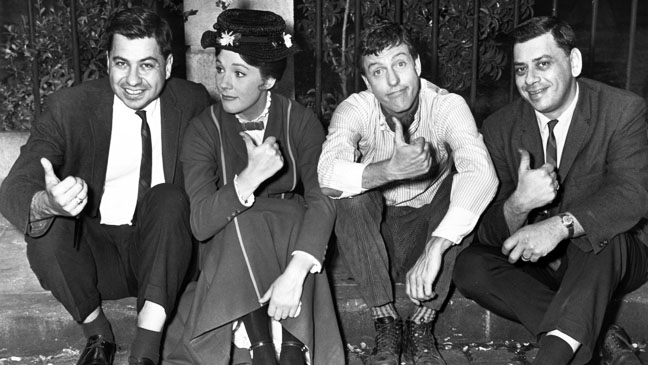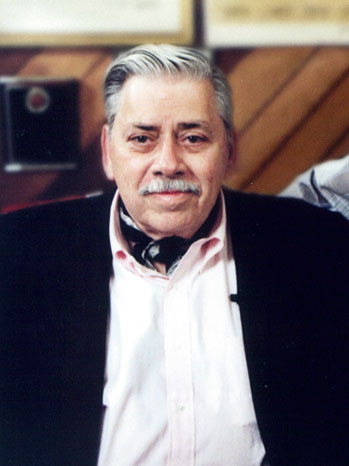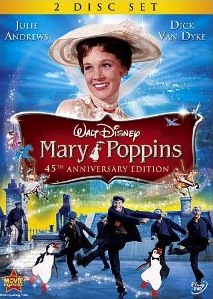On the set of Mary Poppins: (from left) Richard Sherman, Julie Andrews, Dick Van Dyke, Robert Sherman'We Write for Everyone'
Robert Sherman Was Supercalifragilisticexpialidocious
(December 19, 1925-March 5, 2012)
Hello to family and friends,
I have very sad news to convey.
My Dad, Robert B. Sherman, passed away tonight in London. He went peacefully after months of truly valiantly fending off death. He loved life and his dear heart finally slowed to a stop when he could fight no more.
I will write more about this incredible man I love and admire so much when I am better rested and composed. He deserves that.
In the meantime, please say a prayer for him. As he said, he wanted to bring happiness to the world and, unquestionably, he succeeded. His love and his prayers, his philosophy and his poetry will live on forever. Forever his songs and his genius will bring hope, joy and love to this small, small world.
I love you, Dad.
Safe travels.
Posted March 7, 2012 on Facebook by Jeffrey Sherman
***
It is certainly true that musicians live on through their songs long after they have departed this mortal coil, but Robert Sherman is going to be around longer than most, because the songs he wrote with this brother Richard, mostly for beloved Walt Disney films, are so deeply embedded in our cultural DNA.
The Walt Disney-narrated promotional film for the It’s a Small World attraction at the 1964 World’s Fair. The Sherman brothers’ song, written in the aftermath of the Cuban missile crisis, emphasized peace, tolerance and inclusiveness. Originally a slow ballad, it was sped up to livelier pace and sung in counterpoint, a change that so pleased Walt that he retired his original name for the ride, ‘Children of the World,’ and renamed it after the Shermans’ song.Moreover, a few of those songs, as deliciously catchy as they are, also convey important messages for, as they say, kids of all ages. Think of "It's a Small World (After All)," a song written not for a film that millions might see but for an attraction called “Children of the World” Walt Disney Enterprises was creating for the UNICEF Pavilion at the 1964 World's Fair. Walt initially intended to feature the national anthems of all the countries represented on the ride, but discovered soon enough that the competing anthems blended into one big cacophonous wash. Summoning the Sherman brothers, he asked for a song that could be easily translated into multiple languages and be played as a round, so it worked for each country’s scene as park guests passed through the attraction. Coming in the wake of the Cuban Missile Crisis that had the U.S. on the brink of nuclear conflict with the Soviet Union, the brothers’ song was ahead of its time in emphasizing the world as a global community, not a collection of disparate cultures unrelated to one another. It was originally conceived as a ballad, but Walt wanted it to be more upbeat, so the Shermans accelerated the tempo and sang in counterpoint. The revised version so pleased Walt that he renamed the ride after the song: “It’s a Small World.” With its irresistible singsong chorus, "It's a Small World (After All)" not only made its like-titled attraction one of the most popular attractions in all of Disneyland, but subtly conveyed its message of peace, tolerance and inclusiveness, regardless of race, creed or color, and was soon being sung in schools all across America, and indeed, around the world. Today, "It's a Small World (After All)" is reputed to be the most translated and most performed song on the planet. How can that be a bad thing?
'Feed the Birds,' from Mary Poppins, with Julie Andrews as Mary, Karen Dotrice as Jane Banks, Matthew Garber as Michael Banks. Music and lyrics by Robert and Richard Sherman. ‘Songs have been written about a myriad of subjects,’ said Robert Sherman. ‘'Feed the Birds' is the first song written about the merits of giving charity.’Think of that moving moment in the film version of Mary Poppins, when Mary (Julie Andrews) teaches the Banks children, Jane (Karen Dotrice) and Michael (Matthew Garber), an important lesson in charity by way of the tender, hymn-like lyrics of "Feed the Birds" (in fact, the phrase "listen, listen, he's calling to you" echoes the melody and lyrics of Will L. Thompson's 1880 folk song that is a favorite, oft-recorded Christian hymn of invitation, "Softly and Tenderly"). Robert Sherman himself once explained, "Songs have been written about a myriad of subjects. 'Feed the Birds' is the first song written about the merits of giving charity."
Robert ShermanHe went on to explain how the song came to be: "We seized on one incident, in Chapter 7 of Mary Poppins Comes Back, the second book--the bird woman. And we realized that was the metaphor for why Mary came, to teach the children--and Mr. Banks--the value of charity. So we wrote the song and took it up to Walt's office and played it and sang it for him. He leaned back in his chair, looking out the window, and he said: 'That's it, isn't it? That's what this is all about. This is the metaphor for the whole film.' And that was the turning point in our lives ... We were full-time staff, so we had an office at the studio, and every so often Walt would call us up to his office on a Friday afternoon. We knew what he wanted. When we got there, he would say, 'I just wanted to know what you boys were up to these days.' Then he would turn around in his chair and stare out the window, like the first time we played it for him, and he would say, 'Play it.' And we would. And you could just see Walt thinking, 'That's what it's all about, everything we do at Disney.'"
Disney, who died in 1966, predicted “Feed the Birds” would replace Brahms' Lullaby; it is also reputed to be the one song that would bring him to tears every time he heard it.
The Sherman brothers recall their first meeting with Walt Disney. Clip from The Boys: The Sherman Brothers’ Story.Explaining their approach to songwriting in a 1969 interview with the Los Angeles Times, Robert Sherman said: "We don't like the dark side of things, and we want only to entertain people. We like singable songs as opposed to, say, performers' songs. We don't write for someone, we write for everyone."
Few songwriters would be displeased if they had written only "Feed the Birds" and "It's a Small World (After All)." But the Sherman brothers did so much more: "Chim Chim Cher-ee," "Supercalifragilisticexpialidocious," the innovative parenting advice of "A Spoonful of Sugar," "The Tiki Tiki Tiki Room" (another favorite written not for a film or TV show but for a Disneyland attraction), plus songs and scores for other Disney films such as The Parent Trap, That Darn Cat!, Winnie the Pooh and the Honey Tree, The Gnome-Mobile, The Jungle Book, The Aristocats and Bedknobs and Broomsticks.
Johnny Burnette, a live version of his 1960 Sherman brothers-penned Top 10 single, ‘You’re Sixteen,’ one of the best rock ‘n’ roll records of the decade.
Annette Funicello and Dick Clark in an unusual rendering of Annette’s 1959 hit ‘Tall Paul,’ written by the Sherman brothers.Early on in their association with the Disney studio, the brothers had some success in the pop/rock 'n' roll realm, first writing the 1959 hit "Tall Paul" for Disney teen queen Annette Funicello, followed in 1960 by Johnny Burnette's "You're Sixteen," a bonafide early rock 'n' roll classic, one of the best records of the decade. Their first recorded song was Gene Autry's "Gold Can Buy You Anything But Love" in 1951.
Film critic and historian Leonard Maltin best summarized the lasting achievement of Robert and Richard when he told the Los Angeles Times: "You can't help but smile when you sing or hum a Sherman brothers song."
With Walt Disney looking on, the Sherman brothers perform their song ‘It’s a Great Big Beautiful Tomorrow,’ written for the General Electric Pavilion at the New York World’s Fair.In 2008, President George W. Bush awarded the Sherman brothers the National Medal of Arts for creating music that "has helped bring joy to millions."
On February 5, Robert Sherman, who grew up and lived most of his life in Beverly Hills, died at the London Clinic of an age-related illness, his family said. He was 86. In addition to his brother, Sherman is survived by his four children, Jeff, Robert, Laurie and Tracy; and five grandchildren.
In a career spanning almost 50 years, the Shermans accumulated countless accolades, including two Academy Awards and nine nominations, two Grammy Awards, 23 gold and platinum albums, induction into the Songwriters Hall of Fame and a star on the Hollywood Walk of Fame.
From Mary Poppins, ‘Supercalifragilisticexpialidocious,’ written by the Sherman brothers.Though they rarely socialized outside of work--and not all for a couple of decades--the brothers remained close in spirit, as they demonstrated publicly at the 1965 Academy Awards. Having already won an Oscar for Best Score for Mary Poppins, they returned to the stage to pick up a Best Song statuette for "Chim Chim Cher-ee."
With everyone of import having been thanked, Robert Sherman advised the audience that the only thing left to say was "Supercalifragilistic-" Then, as often happened when they spoke, Richard completed his brother's sentence by saying, "expialidocious."
"My brother Bob was a poetic soul with limitless imagination and talent," Richard Sherman said in a statement. "He was my loyal friend all through the years."
A medley of songs from the outstanding Broadway production of Mary Poppins. The medley’s second song, ‘Practically Perfect,’ is the only one not written by the Sherman brothers.The son of Tin Pan Alley songwriter Al Sherman, Robert was born in Brooklyn on Dec. 19, 1925; his brother Richard was born June 12, 1928. The family moved to Beverly Hills in the early '30s when the senior Sherman got a job writing songs for the movies.
Robert Sherman served in the Army during World War II. He was one of the first American soldiers to enter the Dachau concentration camp and later had his kneecap shattered by a Nazi bullet, traumatic events that transformed his worldview and shaped the messages of conciliation, reconciliation and tolerance informing his lyrics. He recovered in hospitals in England, where he moved in 2002 after the death of his wife, Joyce.
When asked how they divided writing the words and the music for their songs, the brothers' standard reply was, "He writes the words and the music, and I write the music and the words."
Their career milestone came with Mary Poppins, the tale of an English nanny and her unruly charges starring Julie Andrews and Dick Van Dyke. It started in 1960 when Walt Disney handed them the first Mary Poppins book, written in 1934 by British author P.L. Travers, the first of a series of four. Disney had been attempting to buy the rights to it since 1938. Travers resisted, insisting a film version of her books would not do justice to her creation, much less an animated cartoon based on it. Disney finally succeeded in obtaining a film option in 1961, although Travers demanded and won script approval rights. (Travers hated the film version, especially the innovative animated sequences, and may have been the only person in the world who was lukewarm about the music. When she was in her 90s and approached about adapting Mary Poppins for the stage, she insisted no Americans be employed in writing the script and that no one from the film production be involved, including the Sherman brothers, who thus by contract were not allowed to write the few new songs that were used in the production, which six years since its opening is still playing to packed houses on Broadway.) Disney promptly asked the Shermans what they thought of its prospects as a movie.
From Mary Poppins, the Sherman brothers’ ‘Spoonful of Sugar’"We said it would make the greatest musical fantasy of all time," Richard Sherman recalled in a 1993 joint Houston Chronicle interview with his brother. "So we underlined some chapters that we felt were really musical. And when we showed Walt our notes and played the song sketches, he pulled out his book, and he'd underlined the very same chapters."
It was, Robert said, "one of the greatest feelings we've ever had."
Dick Van Dyke said the Sherman brothers were "deeply involved" throughout the filming of Mary Poppins.
"They were always on the set helping Julie and I with our interpretation of the songs," he told the Los Angeles Times. "They had a lot to do with the atmosphere, the lightness."
From Snoopy Come Home (1972), the Sherman brothers’ song ‘Me and You’The two brothers, Van Dyke said, "were opposite ends of the pole as far as their personalities were concerned. Robert was the somber one. He kept within himself. Dick was gregarious and outgoing and loves to perform. As songwriters, they were a perfect combination. The emotion was Robert and the fun was Dick's part. They were made by God for Walt Disney. They somehow managed to convey Walt's meaning in those songs."
Despite their long and close working relationship, the Sherman brothers did not socialize for a couple of decades. Various reports have suggested the brothers harbored a deep antipathy for each other. Without glossing over their differences, the Shermans offered a more nuanced view of their relationship.
"Bob and I have great love and respect for one another, and during our professional lives we maintained a facade of unity," Richard Sherman told the Toronto Star in 2009 when the documentary The Boys: The Sherman Brothers Story, was released.
From The Jungle Book (1967), the Sherman brothers’ ‘Colonel Hathi’s March’"But in order to keep working together we came to an agreement to live our personal lives apart, completely separate," he added. "We were comfortable working together, but otherwise it would have been explosive."
The documentary had its origins in a 2002 meeting between Robert's son, Jeff, and Richard's son, Greg, at the 2002 London opening of the stage version of Chitty Chitty Bang Bang. The cousins hoped the film would make the public more aware of the professional contributions of the Sherman brothers and ignite a personal dialogue between their fathers.
"So many personal details are hidden in their songs," Greg Sherman told the Toronto Star. "And for such different personalities, they really had a lot in common: It's impossible to tell who wrote the music and who wrote the lyrics.
"We are different people," Richard Sherman said in the 2009 article. "In the broadest terms, Bob is an introvert who wanted to write great novels, and I was the showman. I loved to perform and he'd rather sit in a corner reading a book."
But, he said, "Success and creativity won out over petty differences. There was no way we were going to let those differences destroy our work."
"A piece of our childhood has been taken away," film music historian Jon Burlingame said upon learning of Robert's death. "They wrote some of the most resonant songs of our childhood, and that doesn't apply only to those of us who grew up in the 1960s but also to those born ever since."
From Mary Poppins, ‘Step In Time.’ Choreography by Marc Breaux and Dee Dee Wood.
From Chitty Chitty Bang Bang, ‘Me Ole Bamboo,’ the sister song to Mary Poppins’s ‘Step In Time’Added multiple Oscar-winning composer-songwriter Alan Menken: "The Sherman brothers' legacy goes far beyond the craft of songwriting, There is magic in their songs and in the films and musicals they breathed life into."
In a statement, Disney CEO Bob Iger described Robert Sherman as “one of the world’s greatest songwriters and a true Disney legend, his legacy will endure forever through the magic of his music. From Mary Poppins and 'It’s a Small World' to Winnie the Pooh and The Jungle Book, Robert, along with his brother Richard, wrote many of Disney’s most memorable and beloved songs, which continue to enchant millions of people around the world to this day.”
The two-disc 45th anniversary of Mary Poppins is available at www.amazon.com
Founder/Publisher/Editor: David McGee
Contributing Editors: Billy Altman, Laura Fissinger, Christopher Hill, Derk Richardson
Logo Design: John Mendelsohn (www.johnmendelsohn.com)
Website Design: Kieran McGee (www.kieranmcgee.com)
Staff Photographers: Audrey Harrod (Louisville, KY; www.flickr.com/audreyharrod), Alicia Zappier (New York)
E-mail: thebluegrassspecial@gmail.com
Mailing Address: David McGee, 201 W. 85 St.—5B, New York, NY 10024





